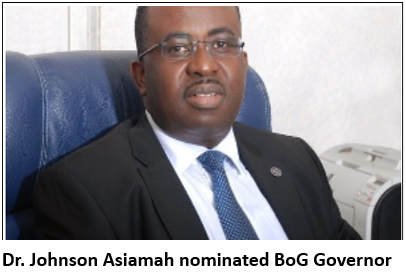The Group Head of Retail Banking at Access Bank (Ghana) PLC, Matilda Asante-Asiedu, has been appointed as the second deputy Governor at the Bank of Ghana (BoG) Her appointment is in accordance with Section 17 of the Bank of Ghana Act, 2002 (Act 612) as amended. The Minister of State in charge of Government Communications and presidential spokesperson, Felix Kwakye Ofosu made this known in a statement issued Monday afternoon [April 28, 2025], Mrs. Asante-Asiedu is a Chartered Banker and corporate leader who has served as Group Head, Retail Banking at Access Bank Ghana PLC. She holds an MBA in Marketing from GIMPA Business School (2021), an MA in Journalism Studies from Cardiff University (2005), and diplomas in Journalism (Ghana Institute of Journalism, 1997) and Politics and Public Affairs Reporting (International Institute of Journalism, Berlin, 2000). She is a Chartered Executive Banker (CIB-Ghana, 2024). She has undertaken Executive Programmes at Said Business School at Oxford University (2023), Wharton School (2015) and Marquette University’s Les Aspin Centre (2003), among others. Prior to moving into the banking sector at Access Bank, Matilda Asante-Asiedu worked as a journalist at Joy FM from 1997 to 2009. She also worked as a consultant/specialist to international organisations. Between May 2010 and June 2015, Matilda Asante-Asiedu worked as Head of Corporate Communications and Brand Management at Access Bank. With her expertise in Corporate Reputation Management and Stakeholder Engagement she managed the Bank’s reputation and spearheaded community investments. Before her appointment as Group Head for Retail Banking in July 2017 at Access Bank, Matilda Asante-Asiedu was the Head of Exclusive Banking, where she led the execution and promotion of the Bank’s strategy for women. She also managed the Bank’s Embassies and NGO’s portfolios as well as Private Banking, all of which form part of her current Portfolio. Attached below is a copy of the statement issued by Felix Kwakye Ofosu, Minister of State in charge of Government Communications President Mahama appoints Second Deputy Governor of the Bank of Ghana President John Dramani Mahama has in accordance with Section 17 of the Bank of Ghana Act, 2002 (Act 612) as amended, appointed Mrs. Matilda Asante-Asiedu as the Second Deputy Governor of the Bank of Ghana. Mrs. Asante-Asiedu is a Chartered Banker and seasoned corporate leader who has served as Group Head, Retail Banking at Access Bank Ghana PLC. Mrs Asante-Asiedu holds an MBA in Marketing from GIMPA Business School (2021), an MA in Journalism Studies from Cardiff University (2005), and diplomas in Journalism (Ghana Institute of Journalism, 1997) and Politics and Public Affairs Reporting (International Institute of Journalism, Berlin, 2000). A Chartered Executive Banker (CIB-Ghana, 2024). She has undertaken Executive Programmes at Said Business School at Oxford University (2023), Wharton School (2015) and Marquette University’s Les Aspin Centre (2003), among others.





